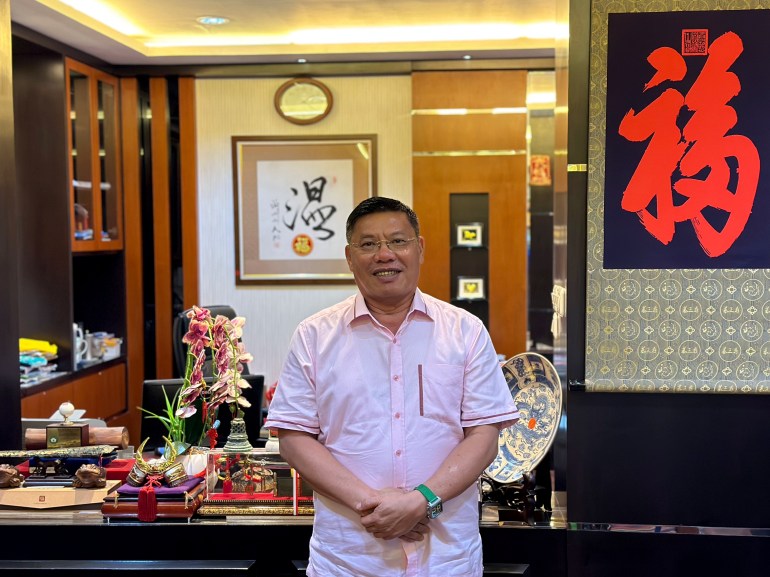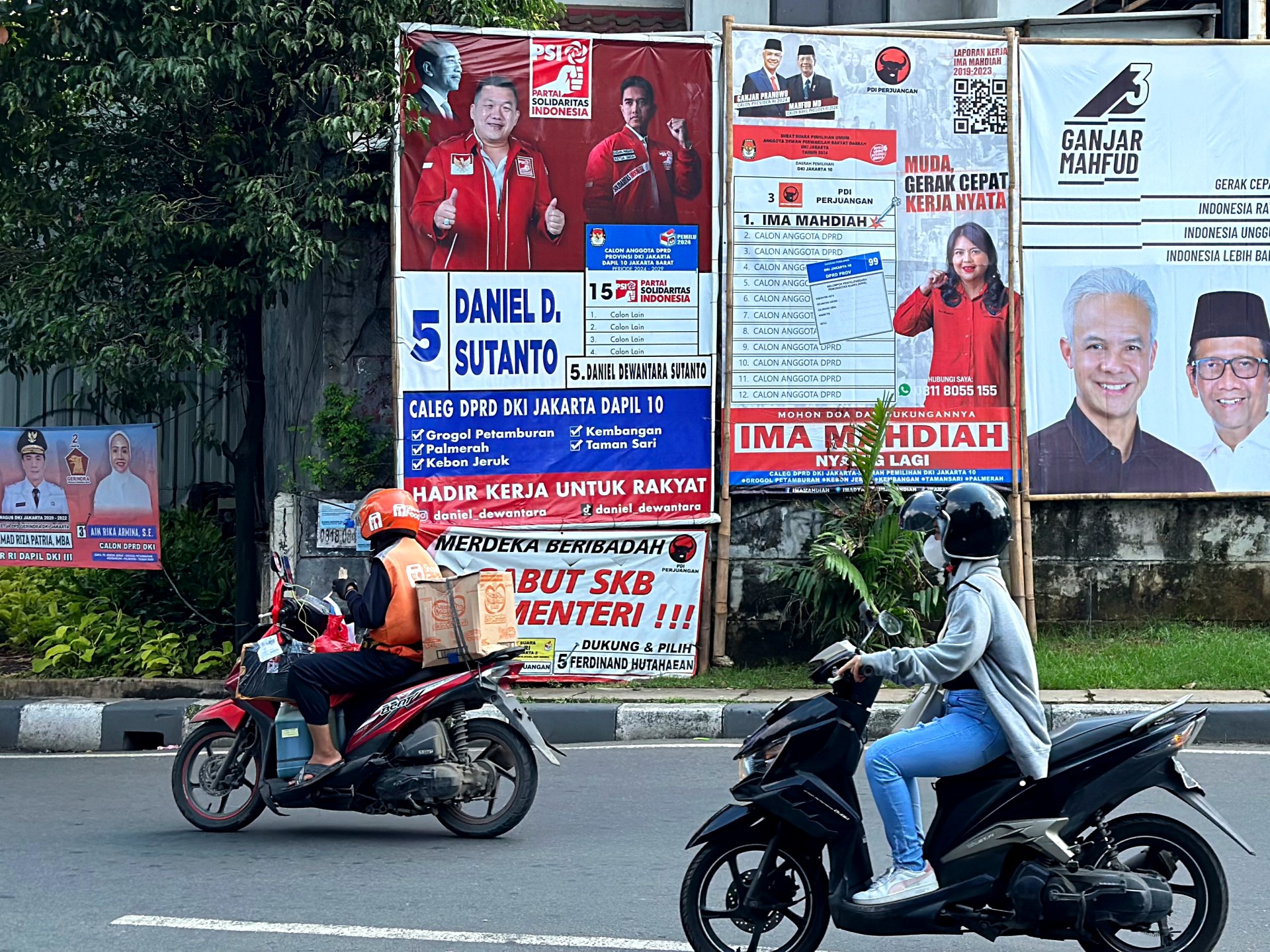‘Fix it from within’: More Chinese Indonesians chase seats in parliament
Jakarta, Indonesia – Indonesia will see almost 10,000 people, including some from the country’s ethnic Chinese minority, competing in Wednesday’s general elections to become one of 580 lawmakers in the national parliament.
According to Indonesia’s General Elections Commission (KPU), there are 9,917 candidates representing 18 political parties across 38 provinces. Among those running are Indonesians of Chinese descent, who accounted for about 2.8 million of Indonesia’s then-237 million people, in the 2010 national census. The more recent census in 2020 did not list its ethnicities.
For Chinese Indonesians, democracy has afforded them political rights that were once restricted.
During more than 30 years under the rule of Soeharto, who resigned following mass protests in 1998, Chinese Indonesians were not allowed to publicly celebrate the Lunar New Year and assimilation policies were introduced to make them more “Indonesian”, effectively turning them into second-class citizens. Many turned to business and the private sector to earn a living after they were limited from government positions.
“Politics is not for everyone,” said Taufiq Tanasaldy, a senior lecturer in Indonesian and Asian studies at the University of Tasmania. “Particularly for the Chinese who had endured decades of discriminatory policies under the Soeharto regime.”

But Taufiq said interest had “grown post-Soeharto due to political reforms and policies aimed at eradicating discriminatory practices”, referring to equal opportunities for ethnic Chinese to run for office and vote for their preferred candidates.
“The elections or appointments of several Chinese individuals to national and regional politics sparked this growing interest. The visibility of their initial ‘success’ has been important to the Chinese community,” he told Al Jazeera.
Among the prominent Chinese who have gone into politics is former Jakarta Governor Basuki Tjahaja Purnama, popularly known as Ahok. He was later jailed for blasphemy over comments made on the campaign trail and has adopted a lower profile since his release.
“Representation has been steady, certainly not getting worse,” Taufiq said.
But for many Chinese Indonesian voters, Taufiq said, “parties with nationalist platforms are more attractive compared to those championing sectarian values … particularly at the national level”.
With more than 270 million people, Indonesia has almost 205 million eligible voters participating in the 2024 poll. The general elections are set to take place just four days after the Lunar New Year. February 14 is also Ash Wednesday, a holy day for Indonesians who are Catholic.
Despite representation, the current system of proportional representation could disadvantage some candidates who now have to campaign directly for seats.
R Siti Zuhro, a research professor of political science at Indonesia’s National Research and Innovation Agency (BRIN), says the open-list made it “very difficult to compete” for some candidates compared with the previous system where votes went to the party rather than the individual candidates.
“It is more dependent on the legislative candidate [to do the work] – either their effort or money – in carrying out tactical strategies, not the party,” she told Al Jazeera.
Al Jazeera spoke to three Chinese Indonesians who are running for the national parliament.
Fuidy Luckman, PKB
Fuidy Luckman is a candidate for the Muslim-based National Awakening Party (PKB) which supports Anies Baswedan and Muhaimin Iskandar for president and vice president, as Muhaimin is its current chairperson.
One of PKB’s founding figures was Indonesia’s late president Abdurrahman Wahid, popularly known as Gus Dur, who lifted the ban on public Lunar New Year celebrations while in office in 2000.

Originally from Singkawang in Indonesia’s West Kalimantan province, 61-year-old Fuidy moved to Jakarta for university in 1983 and has lived there ever since.
He campaigned in some of the poorest parts of the sprawling capital, meeting residents and also posting videos on TikTok and Instagram.
Fuidy, who owns a company in the wood industry in Jakarta, urged Chinese Indonesians to come out and vote and take part in Indonesia’s “festival of democracy”.
“We ethnic Chinese do not need to feel allergic to politics because we live in Indonesia,” he told Al Jazeera.
“Do not ask to be recognised as Indonesians when we instead put aside the [democratic] processes.”
If he gets elected, Fuidy wants to pursue programmes related to “justice” and “equality” – focusing on more affordable education and healthcare.
Mery Sutedjo, Partai Buruh
Mery Sutedjo joined Partai Buruh (Labour Party), whose founders include Indonesia’s various national trade union confederations.
The party is headed by labour activist Said Iqbal and has not officially supported any presidential candidate.
Mery, who runs a housing construction company, says she found Partai Buruh to be the right platform to push for better social welfare and law enforcement for the Indonesian working class, including blue-collar and white-collar workers.
Born in Medan in Indonesia’s North Sumatra province, the 54-year-old moved to Jakarta more than 30 years ago for university and is hoping to win one of the capital’s seats in the national parliament.
As part of her campaign strategy, Mery hands out her business cards to people she meets and introduces herself. She has also asked for her family, friends and business contacts for their support.
“I hope there’s an opportunity and possibility for people like me – for an ordinary female Chinese minority without political experience and background to run for office,” she told Al Jazeera.

Redi Nusantara, Perindo
A candidate with the Perindo Party, Redi Nusantara is running in Indonesia’s Central Java province.
Perindo is backing the presidential pair of Ganjar Pranowo and Mahfud MD. It backed outgoing President Joko Widodo when the leader won his second term in 2019.
The 55-year-old, who owns a factory making metal racks for cabling, wants to attract more foreign investments into Indonesia and develop a tax regime that encourages manufacturers to use domestic products rather than imported components that arrive in the country through special economic zones.
Originally from the provincial capital Semarang, Redi is targeting the country’s ethnic Chinese and business communities, as well as first-time voters. He is also hoping to change the minds of those who might be planning to abstain from voting.
Redi also appeared on video podcasts, talking about entrepreneurship.
He encourages Chinese Indonesians – especially the younger generation – to enter national politics and “fix it from within”.
“For all of us ethnic Chinese, especially young people, we must understand Indonesian politics,” Redi told Al Jazeera.
“Because if we, the Chinese community, do not understand the parliament, we will always be the cash cow of the Indonesian economy,” he said, hoping increased political participation will help change the lingering stereotype that ethnic Chinese care only about doing business.




